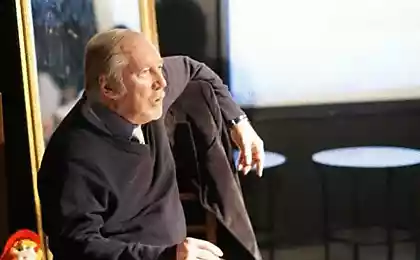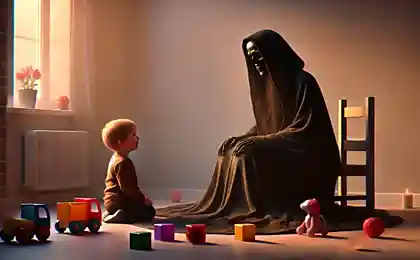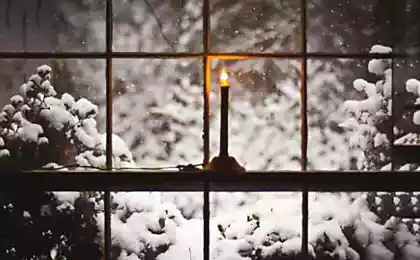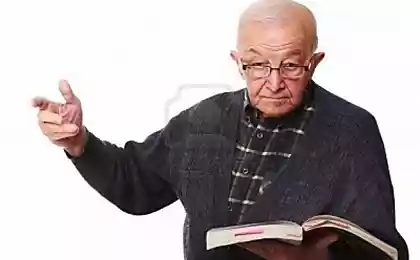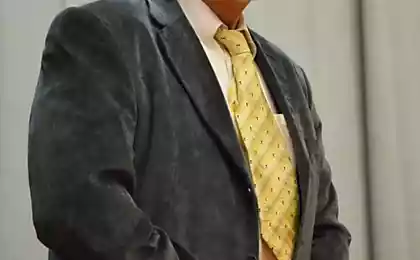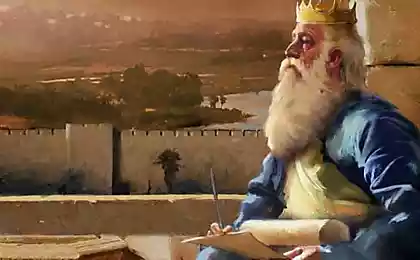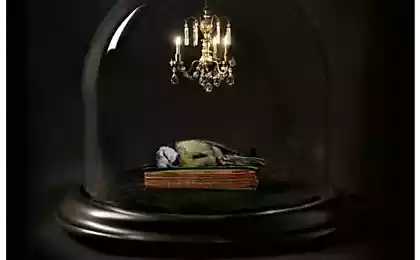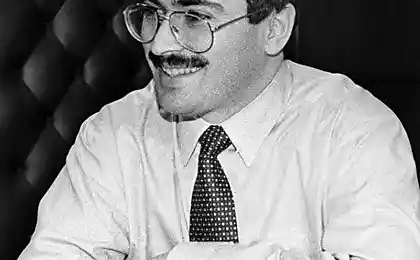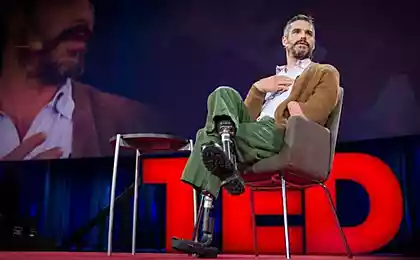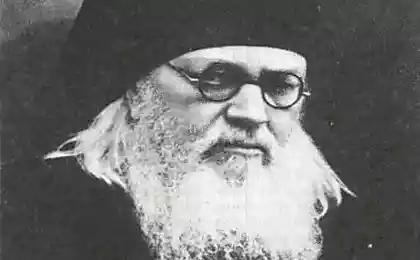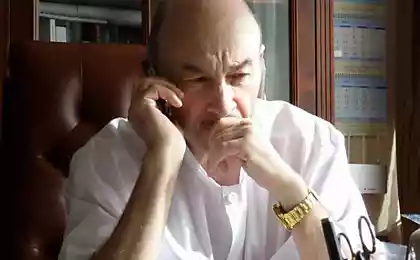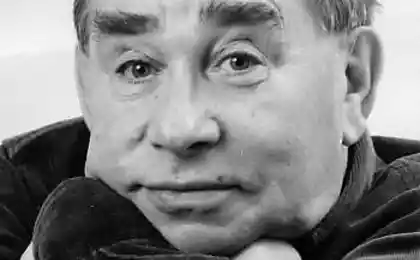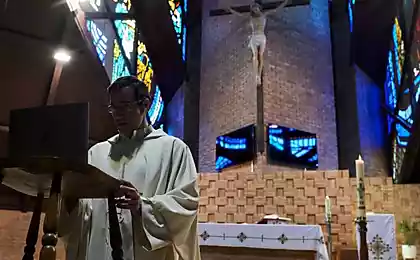932
Andrei Gnezdilov: Past the finale of his own life, we can't move
You may not go to a resort or on a tour, not go to College or work. But by the finale of his own life, we can't move. And by that, what will happen then, too.
Psychiatrist Andrei Vladimirovich Gnezdilov works with the most severe cancer patients. A quarter of a century ago he founded the country's first hospice hospital, where make life easier and the suffering of people whose hope is microscopically small, or it does not. Today he is called the First hospice in Lakhta near St. Petersburg. From there began the Russian hospice movement.
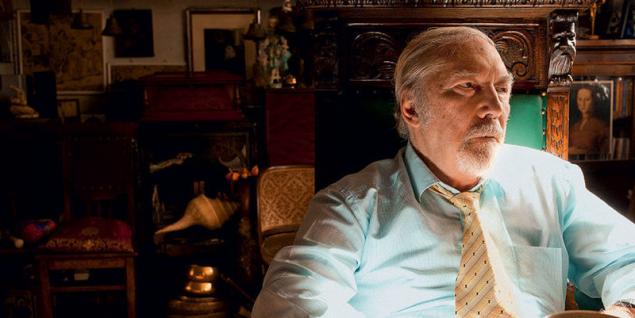
We are talking to Andrei Vladimirovich, who is also called Dr. Balu, in his apartment full of mysterious things, dolls and fairy tale characters. Dr Gnezdilov wrote works in psychotherapy, and Dr. Balu — tales, that also help patients.
The main conclusion of our conversation — the rule of life, not death, and we move it up along its ringing strings to the end to be high. And to whom this very highly.
Often patients returning from the hospital, from the Institute, burn your old wardrobe, says Dr. Gnezdilov. — Idea: to separate from the disease, to change the stereotype. And that's the part I used, I got a theatrical wardrobe, which we use for a person to be transformed ourselves.
You sick come home?
Yes, of course! Many are kept because they again begin to live for the interests of some other region or overcoming those situations that drove them to the disease. Frequently disease, and especially cancer, is, I would say, metaphysical.
The Covenant Of Paracelsus
— We hear the cry, we rush to help. Not always patients want of this assistance. I go on hospice, I see patients who crouched grimace of pain on his face. I said, "What's wrong with you? Are you hurt?" — "Never mind, doctor." — "How not to pay attention? We are a movement raised and the hospice opened in order for you don't experience pain". "Doctor, you know, I think that along with the pain I bring out all the bad".
Bang! Acts as a moral principle. When we get sick, we think, somewhere sinned, something not so made. And here it turns out that sickness and pain are not as a punishment but as atonement.
And then I remember Dostoevsky, Tolstoy, and our whole galaxy of famous writers and teachers of life. Of course, in these conditions, the movement of hospice services acquires ethical character. Because you can not so to heal, but at least ease the man's suffering, a smile, a special relationship. And this also applies to the gerontology, the care of elderly. We found so many unironed old that we by the time to cry, because touching human gesture of affection, he starts to cry. And he's crying? And I said, no strokes.
Can this be considered medicine? She does not cure until recovery.
The medieval physician Paracelsus said that the time will come, and every doctor should become the medicine for the patient. Impossible to cure, impossible to turn away too. If you can't help, stripped it with him, because he's not allowed to throw alone against the tanks, which brings with it a destiny. Problem narrowed down to the fact that palliative medicine should only quench the pain, but the very concept of pain is quite complex.
Because the pain sometimes is in the nature of relationships psychosomatic when psychological impasse in life turns on a somatic disease, that is real. A real doctor is someone who comes to the patient and even without writing a single line of the recipe, but simply speaking, a kind of soothing.
Back in the old days noted that there are special midwives who are well-attended childbirth, there are nurses, an entire community of caregivers who were put to the child, and the child recovered. These nurses even checked: they wore pearl and turquoise with dying, which ones fade, and the stones are again filled with colours and freshness. It is a fact that is widely known.
For God's sake, don't take me for a fan of psychic — I'm against it, but fact is fact.
That is important, not just hospice, but primarily the identity of the doctor?
This idea that we were in hospice movement. It's romance, it's a dream. The doctor could declare that it is not scary, not painful, not lonely, he has to survive the tragedy or the loss of a loved one, or their own illness.
There are some scenarios of life that serve as a motivation to go to medical school, become a helper of mankind. In the myths of Ancient Greece refers to the centaur Chiron, who was on the side of the titans fought with the gods, we made it, everything is fine. He was artistic, fond of music and was sensitive in this man-horse. It came to heroes, talked about their problems and exploits.
And Hercules also got into the habit. One came to tell how he coped with the terrifying birds as they were shot from a bow. The centaur asked to show his bow, began to twirl arrows: really such it is possible to kill the birds? "Be careful, arrows poisoned with poison Lerna Hydra. If you carpesica, be evil," warned Hercules. He laughed: "Hercules, have you forgotten that I'm immortal, nothing can hurt me".
Suddenly and accidentally scratches his hand, a terrible poison poured into his body and begins to devour it. He seeks salvation from the pain in minerals, plants. Something easier, something aggravates his condition. In the end, he becomes well-versed in medicine and the raising of the God Asklepios. Wounded healer — that's what it's called.
Either the person experiencing the pain, or the memory of the pain experienced by his parents, or lying ahead of him some pain and he feels her. This pain is a stimulus to self-sacrifice.
Call Granik
— There used to be knights, Templars, Hospitallers, they arranged for the pilgrims coming to worship the shrines, monasteries, them, when necessary, defended, gave them shelter during the journey. They were called home gostepriimstvo, hospices. Hospitality — hospitality.
But all this is much deeper. The life of any person can be represented as wandering. We go, we hammer together the state and so on. But this is not the meaning of life. And the meaning of life is the Savior's example.
If you remember, before you go to Calvary, he prayed in the garden of Gethsemane. And he prayed: "Lord, this chalice pass from me". But before that, he told his disciples: "Stay with me, don't sleep". Three times he cried out to him, and three times they said, "Yes, master". And three times they fell asleep.
Actually hospice movement somewhere in the depths many — although I don't know, I speak for myself — are perceived as a call to stay with the patient. The biggest psychotherapeutic impact on the patient has not even medication and psychotherapy presence. Very often an adult, once in a situation of illness, is back on the path of his childhood. And as a child, the child resorts to mom: "Mom, I hurt my knee." She will kiss this place, Pat — all passed, ran on. From these bases grows hospice movement.
How hospice movement began among us?
We must first remember Daniil Granin, which in the 1980-ies from the rostrum addressed the people and said: "Citizens, comrades, friends, do not expect that the authorities will ever attend to your situation. If you want to do something good, rush to do good now on its own".
And then I remember the great rise was in people. Met, were willing to give the apartment building, each in his tune blew. I blew in rospisnoy tune, not even knowing that hospice exists.
Ten years ottrubil in the Cancer Institute, which came from the Bekhterev Institute on their own, when in Oncology in General were not psychiatrists. I understand that not all of this mass to drag — and there were three hundred patients. Another was a dose Babayan, chief psychiatrist, who then reigned: 50 mg of the drug per day and no more, otherwise the patient will become a drug addict. As if that mattered, a man will become a drug addict or not, dying.
Nothing and nothing
The first hospice we organized in 1990. Came to the British journalist Victor Zorza, he was actively engaged in hospices in England, and when it became possible, and came to the us.
Victor Sorti and expense, went to England, I studied there as all this should be arranged. Thanks, I think Granin followed me in the group not even nurses, but simply do not have the medical education people who came to the hospice.
Who could they be? Nurses, nurses — there is no required education. Penny salary. And a retrained sisters. But the most interesting, the team that was such that I remember every single one. Poor conditions, rural hospital in Lahti, built by Princess Olga. But it's warm. There something happened that I never saw in the world — the equality of all health care workers.
I mean?
In a regular hospital includes who's in charge? The chief doctor. And then the chief medical officer. And then the doctors. And then sister. And then nurses. And then sick. When the patient should be first! And should be the reference group that he trusts his health and so on.
There is no resentment that the patient is candid and asks to have sent to him not as a physician, and, say, a nurse. Which is just easier.
Don't know if you've ever been in the hospital, where everything is immediately limited to the question of the chair. You are in the house, and you and three other people. It doesn't matter. You have to go in big. Right here lying in bed, in diapers and stuff. But are you embarrassed to fart or something. And is suddenly zinotchka, our nurse, which was once a thrush from Romanov. Cared for the cow that gave the milk Grigory Romanov.
The first Secretary of the Leningrad regional Committee of the Communist party?
Well, Yes. And here she is being such a, well, slightly ridiculous. Tall, rough around the edges. But calm some. It comes, waiting for her sick when she comes on duty. If her poop is not scary and it all naturally. Why? All right. Calm down. Podter, podmilj all. This is very important were that people could afford to choose with whom they feel lighter. Partnerships.
It was a religious institution?
Not religious, but spiritual. What is the spirit? Everyone understands what you want. But first of all I think that spiritual means religious. Call the priest and so on. But this is only part — religious care for the sick. Moreover, each of the denomination to which he belongs.
Spirituality is much deeper. This is the introduction into the consciousness of the patient some of the ideas about death. Because they ask: what are they waiting for what will happen next. And important our task is not to give a recipe of an easy death to the patient, and that he comprehended it.
Meaningful death is associated with the understanding of life. And die much easier when you know what die. Or dedicating your death: for example, "let me die, but my children are healthy."
But the man does not die in the act of self-sacrifice, and from the illness that happened to him involuntarily.
My patient had surgery, he saw that she had colon cancer. Touch it did not, took only a biopsy. And was discharged, saying that everything is in order. She understood that it was not in order, it just said, for words. Says: "I must live. My daughter, my husband is an alcoholic. And I'm sick of the fact that her husband chased me drunk with an axe and stabbed in the crotch with his foot. I have a month and a half started to grow a tumor. I have to live."
And she lives. Lives a year, although her month was not given. Half lives. Finally, it somehow gets: a husband somewhere faded, unable to withstand the smell, there was some kind of cousin, daughter settled in College. She said: "Now I can die in peace. All attached". And dies.
Doing her autopsy found cancer. There is no doubt that it was, in fact, she just beat cancer. She was so involved with the daughter, and internal this setup was.
So talk about what the disease is self-sacrifice, not on an empty place has arisen.
Incidentally, it is curious that when come the young doctors at the cancer clinic or in the hospice, their first question: "are there any cases of healing?" There are.
And a great example is the story of Seraphim of Sarov. Father Motovilov was good friends with him and now seriously ill. Began to talk about what "you're not ready to die." "Yes, father, not ready, don't know how to be." "Okay, pray, think". Come next time and says, "You'll live, instead of you agreed to die, my spiritual daughter, your cousin. She's already ready for anything, it is you will die." And really, dying sister, and this remains.
Now, here, for example, in St. Petersburg, people, a cancer patient stage four, can always count on rospisnoy help?
Yes. We remember Victor Zorza. He said that it is better we not going to open a hospice, than make him pay. And then the principle of free palliative medicine we took dozens of institutions across the country. Actually I'm not even going to say how hard it was to raise and stir up the masses, to instill in them something new.
Why Russia is such a stumbling block? We have any initiatives dissolve into nothing and no end. We may, therefore, survive the bad and good comes out, is buried. Therefore, in Russia everything is hard to get accustomed.
Unfortunately, to give the person the assurance that to die it will not hurt, not lonely, not afraid, is too much responsibility, it is necessary to sacrifice themselves just.
The inner child
— Look, she's ugly, but so cute! I just call her Peggy, Maggie and Molly. In the morning she Peggy, Maggie day, evening, Molly, she knows and lullabies.
Why dolls?
This is a special beings, which are associated with psychotherapy. This is the first friend of the child, because it is small, and the doll is even smaller. And dolls, he loses the relationship to impose his parents.
And there are so many interesting things going on. Never without tears, because the meeting with the child stirs in the patients very much. This is a reserve that we have in life.
Because the child is different from an adult? A child has imagination, he can own the world, without assigning it, and releasing it freely. This possibility of irrational thinking, inherent in the child, comforting the adult. Because each inner child is alive and rescues from the most difficult situations — even when we say that cancer is the last stage, time to die.
The inner child says: "And no death. If she does threaten me, then it's not!" And his thinking is affective; it is filled with emotions, his faith. She helps him overcome many problems. So we practice psychotherapy as a return to childhood.
Astonished medics are divided: we have a Professor at the clinic which he himself has created, turns to the nurse, said, "could You read this?" "You are welcome. What would you like to read?" — "Fairy tale". "Why a story?" "Because in the story there is an element of a miracle."
People can be divided into:
And I started to write a fairy tale about our patients. If suddenly starts sounding tale, then it means you have the abyss of time not less than that of Scheherazade and the tale in this sense allows you to create layouts like a new life.
Where are these dolls?
Do. I was looking for storytellers, not found, and it was very sad. And suddenly I came across puppeteers. And the puppeteers, it turns out, also storytellers, they make fabulous figurines that represent the people. Replace — meaning that they can build a future.
To build a future?
Yes. You know that the action is lost in some situation, easier to be implemented in reality? Sometimes the doll becomes a talisman. Most importantly, there is the so-called transfer. The patient came to the doctor and said, "I'm the Nutcracker, I came to serve you." And gave the doll. Because of stubbornness, perseverance, pride the patient cannot trust the doctor. But he puts the doll to the sore spot — and it becomes easier! Here is a doll that has comforted so many patients!
Death and miracles
In his books, along with a detailed description of psychotherapeutic techniques as well as the States experienced by cancer patients, and tell you about the unusual phenomena associated with clinical death.
Clinical, not clinical — it is still associated with the same.
When is a death? Cardiac arrest, cardiac brain, nothing comes, nothing comes. And in fact, when a person dies, his heart stopped, stopped the blood, the brain is not working the person experiencing what distant lands.
A simple peasant from Pskov region, suddenly says in fluent English — a personal experience. I sat next to her, she was dead, suddenly wakes up, smiles and says: "Doctor, you know what I saw now?" I ask: "What did you see?" "I saw that I was in some strange place. I understand that this is England and I'm in a white dress of the bride needs to walk down the stairs and go to Church to get married. And my name is Annie".
I wonder what her Russian name sounds in English that is Annie. I said, "Do you speak english?" And suddenly she answers me in English, it sounds beautiful. Something else said, hand fell, his eyes dimmed, and died.
All sorts of miracles, which all argue, have quietly happen. The dying patient in a coma in his room put a second patient. And he saw that this dying was afraid for himself and he called the priest to confess, to take communion just in case. Came and gave communion. The priest goes off, turns to say goodbye, and suddenly wakes up dying first and looks with an expression that mistake is difficult.
Priest: "You also might want to partake?" He has no voice, his eyes blinking: Yes. He had a communion. Tried to go again the threshold turns to say goodbye: "bye!" — and this, the first patient, had died. Last minute, submit, and receive the sacrament — it is something! And feel it, and only the tears in his eyes.
What is important to know that by living and remembering the dead?
I love Heraclitus. He said: "People in the death night light lights himself; and he is dead, put out his eyes, but alive; but he is in contact with a dead Napping, awake in contact with the dormant".
I really don't want to criticize our Christianity, but it seems to me that so many talking about sin, we should not forget about the joy. I was brought up by Rabindranath Tagore, where such optimism, such light, the colors, the brightness, the love. And for me, God appears not as judge, but as love. If you keep the love of God, it has the opportunity to hope for salvation. Here is how you can Express.
But here is not only based on divine description, there is Robert burns tucks, the epitaph on the tomb:
"Here I lie, Jimmy Hogg.
Perhaps the sins God will forgive me,
What I would do if I were God,
And he, the late Jimmy Hogg!"
It's a joke, of course, but nevertheless I think it is much deeper. And that means: someone saved, someone saved? I think that in some profound sense the whole world is striving for unity. To believe that God created something wrong, hard.
Confessors pain
People lose strength, get sick, and dwindle from quite simple things, stress. Where does force the doctor and all the staff of the hospice? How they manage to stay?
You know, oddly enough, like cures like. And, so to speak, we are induced in our professional burnup of patients. On the one hand, they are precisely the factor that we burn, and on the other it sick be the motivation support and help.
You know, we stew them in one pot. So do not rush to throw stones at doctors and medical staff: that they have to endure, to accept, is in fact to condemn ourselves to permanent residence in a negative field.
We're used to the sick when we are with them a peck of salt eaten with pain. And virtually all the suffering the patient endures, we also carry myself in a reduced size, but more often. But generally it is... What word to find? Confessors pain. So, maybe. That's what the hospice doctors.
But, of course, we hold not only for the sick who support us, we are for the loved ones. By the way, you can check even mentally and speculative, who's a friend of yours. Not one who shares with you the joy and fun of somebody who you would have picked, dying, to his bed like mourners.
Is there a community of doctors in the hospice?
It exists, but it's... I mean in the West it no longer exists. We have all the time so many problems that it is difficult to exist. And then we are all built on some competition: whose hospice better. Bullshit. Who will die, who will die? What criteria to choose? Therefore, it is very difficult.
But you're talking about the cohort of the iron knights. Still, this cohort exist?
It exists in people. Even, perhaps, not the doctors, and those who are able to understand and feel.
The last lullaby
One simple woman talking to me, said: "Andrey, tell me frankly, I am not afraid of death!" I answer: "what do you mean, we're all scared, there's nothing wrong". "I have a case," she says, " I lived a happy life, though was not married to a wealthy man and so on. But I wanted to get married and have a girl — I was born a girl, then wanted her granddaughter — a granddaughter was born. In General, I lived a decent and adequate life. And learned about her, everything there was to know in my position, I want more."
Can you imagine: death to seek an explanation for life! It's a great thing. This is the beginning of some kind of optimistic philosophy, or something.
Reading your book "the Way to Calvary", I noticed that a person's reaction to the news of having cancer is quite typical and predictable, and his behavior is also classified. Catch yourself the impression that we, the people, do the numbers and kind of mechanical. The question arises: is there in man something at the same time and unpredictable and this is absolutely real?
Well, you know, if to generalize, it is necessary to remind about another factor: every dying man gives himself permission to die. It can be a smile of a close person... Permission to die from family, from the priest... the Man himself will allow herself to die.
And death is sometimes seen as a balloon that leaks air. It falls — and all...
In fact, the last step — it is frequently accompanied by tension. A man needs to step into the unknown. Allow yourself. He stops fighting and walks. And it picks up the current.
In this sense, it is interesting statement by Alexander Sokurov. He came to us there, in Lahti, and admired it. Says: "What a beautiful place to die". And what it is? "But the Bay side by side. Is the same as the area for aircraft that take off"...
Died one woman. I sat with her husband. He was holding her hand, as if all the rules. She's not dying. Are looking sister and said, "You keep it. She will not die while you are here." "What should I do?" "Go take a walk for an hour and come back." He left to go out. Sister sat on his place, took the patient's hand and sang. What do you think sing? Lullaby. Suddenly a sick smile. Slept with her, this languor of the dying. Put the handle under his cheek and like a child, such an attitude is adopted. And left... Left with a smile lull with a lullaby.
Andrey Gnezdilov was born in 1940 in Leningrad. His father is a famous scientist-Parasitology, mother is a sculptor.
Receiving in 1963, the diploma of a General practitioner, later he became a psychiatrist at psycho-neurological Institute named after Bekhterev, where it comes in the Leningrad research Institute of Oncology. N. N. Petrova, guided by the idea of psychological help the most severe patients. His public lectures promote acquaintance with the English journalist and activist in the hospice movement Viktor Sorti.
With the support of Anatoly Sobchak in 1990 in the suburbs of St. Petersburg (then Leningrad) Lakhta, they opened the country's first hospice — medical facility to assist terminally ill.published
Interviewed By Mikhail Rogozhnikov
P. S. And remember, just changing your mind — together we change the world! ©
Source: expert.ru/russian_reporter/2015/12/ranenyij-tselitel/
Psychiatrist Andrei Vladimirovich Gnezdilov works with the most severe cancer patients. A quarter of a century ago he founded the country's first hospice hospital, where make life easier and the suffering of people whose hope is microscopically small, or it does not. Today he is called the First hospice in Lakhta near St. Petersburg. From there began the Russian hospice movement.

We are talking to Andrei Vladimirovich, who is also called Dr. Balu, in his apartment full of mysterious things, dolls and fairy tale characters. Dr Gnezdilov wrote works in psychotherapy, and Dr. Balu — tales, that also help patients.
The main conclusion of our conversation — the rule of life, not death, and we move it up along its ringing strings to the end to be high. And to whom this very highly.
Often patients returning from the hospital, from the Institute, burn your old wardrobe, says Dr. Gnezdilov. — Idea: to separate from the disease, to change the stereotype. And that's the part I used, I got a theatrical wardrobe, which we use for a person to be transformed ourselves.
You sick come home?
Yes, of course! Many are kept because they again begin to live for the interests of some other region or overcoming those situations that drove them to the disease. Frequently disease, and especially cancer, is, I would say, metaphysical.
The Covenant Of Paracelsus
— We hear the cry, we rush to help. Not always patients want of this assistance. I go on hospice, I see patients who crouched grimace of pain on his face. I said, "What's wrong with you? Are you hurt?" — "Never mind, doctor." — "How not to pay attention? We are a movement raised and the hospice opened in order for you don't experience pain". "Doctor, you know, I think that along with the pain I bring out all the bad".
Bang! Acts as a moral principle. When we get sick, we think, somewhere sinned, something not so made. And here it turns out that sickness and pain are not as a punishment but as atonement.
And then I remember Dostoevsky, Tolstoy, and our whole galaxy of famous writers and teachers of life. Of course, in these conditions, the movement of hospice services acquires ethical character. Because you can not so to heal, but at least ease the man's suffering, a smile, a special relationship. And this also applies to the gerontology, the care of elderly. We found so many unironed old that we by the time to cry, because touching human gesture of affection, he starts to cry. And he's crying? And I said, no strokes.
Can this be considered medicine? She does not cure until recovery.
The medieval physician Paracelsus said that the time will come, and every doctor should become the medicine for the patient. Impossible to cure, impossible to turn away too. If you can't help, stripped it with him, because he's not allowed to throw alone against the tanks, which brings with it a destiny. Problem narrowed down to the fact that palliative medicine should only quench the pain, but the very concept of pain is quite complex.
Because the pain sometimes is in the nature of relationships psychosomatic when psychological impasse in life turns on a somatic disease, that is real. A real doctor is someone who comes to the patient and even without writing a single line of the recipe, but simply speaking, a kind of soothing.
Back in the old days noted that there are special midwives who are well-attended childbirth, there are nurses, an entire community of caregivers who were put to the child, and the child recovered. These nurses even checked: they wore pearl and turquoise with dying, which ones fade, and the stones are again filled with colours and freshness. It is a fact that is widely known.
For God's sake, don't take me for a fan of psychic — I'm against it, but fact is fact.
That is important, not just hospice, but primarily the identity of the doctor?
This idea that we were in hospice movement. It's romance, it's a dream. The doctor could declare that it is not scary, not painful, not lonely, he has to survive the tragedy or the loss of a loved one, or their own illness.
There are some scenarios of life that serve as a motivation to go to medical school, become a helper of mankind. In the myths of Ancient Greece refers to the centaur Chiron, who was on the side of the titans fought with the gods, we made it, everything is fine. He was artistic, fond of music and was sensitive in this man-horse. It came to heroes, talked about their problems and exploits.
And Hercules also got into the habit. One came to tell how he coped with the terrifying birds as they were shot from a bow. The centaur asked to show his bow, began to twirl arrows: really such it is possible to kill the birds? "Be careful, arrows poisoned with poison Lerna Hydra. If you carpesica, be evil," warned Hercules. He laughed: "Hercules, have you forgotten that I'm immortal, nothing can hurt me".
Suddenly and accidentally scratches his hand, a terrible poison poured into his body and begins to devour it. He seeks salvation from the pain in minerals, plants. Something easier, something aggravates his condition. In the end, he becomes well-versed in medicine and the raising of the God Asklepios. Wounded healer — that's what it's called.
Either the person experiencing the pain, or the memory of the pain experienced by his parents, or lying ahead of him some pain and he feels her. This pain is a stimulus to self-sacrifice.
Call Granik
— There used to be knights, Templars, Hospitallers, they arranged for the pilgrims coming to worship the shrines, monasteries, them, when necessary, defended, gave them shelter during the journey. They were called home gostepriimstvo, hospices. Hospitality — hospitality.
But all this is much deeper. The life of any person can be represented as wandering. We go, we hammer together the state and so on. But this is not the meaning of life. And the meaning of life is the Savior's example.
If you remember, before you go to Calvary, he prayed in the garden of Gethsemane. And he prayed: "Lord, this chalice pass from me". But before that, he told his disciples: "Stay with me, don't sleep". Three times he cried out to him, and three times they said, "Yes, master". And three times they fell asleep.
Actually hospice movement somewhere in the depths many — although I don't know, I speak for myself — are perceived as a call to stay with the patient. The biggest psychotherapeutic impact on the patient has not even medication and psychotherapy presence. Very often an adult, once in a situation of illness, is back on the path of his childhood. And as a child, the child resorts to mom: "Mom, I hurt my knee." She will kiss this place, Pat — all passed, ran on. From these bases grows hospice movement.
How hospice movement began among us?
We must first remember Daniil Granin, which in the 1980-ies from the rostrum addressed the people and said: "Citizens, comrades, friends, do not expect that the authorities will ever attend to your situation. If you want to do something good, rush to do good now on its own".
And then I remember the great rise was in people. Met, were willing to give the apartment building, each in his tune blew. I blew in rospisnoy tune, not even knowing that hospice exists.
Ten years ottrubil in the Cancer Institute, which came from the Bekhterev Institute on their own, when in Oncology in General were not psychiatrists. I understand that not all of this mass to drag — and there were three hundred patients. Another was a dose Babayan, chief psychiatrist, who then reigned: 50 mg of the drug per day and no more, otherwise the patient will become a drug addict. As if that mattered, a man will become a drug addict or not, dying.
Nothing and nothing
The first hospice we organized in 1990. Came to the British journalist Victor Zorza, he was actively engaged in hospices in England, and when it became possible, and came to the us.
Victor Sorti and expense, went to England, I studied there as all this should be arranged. Thanks, I think Granin followed me in the group not even nurses, but simply do not have the medical education people who came to the hospice.
Who could they be? Nurses, nurses — there is no required education. Penny salary. And a retrained sisters. But the most interesting, the team that was such that I remember every single one. Poor conditions, rural hospital in Lahti, built by Princess Olga. But it's warm. There something happened that I never saw in the world — the equality of all health care workers.
I mean?
In a regular hospital includes who's in charge? The chief doctor. And then the chief medical officer. And then the doctors. And then sister. And then nurses. And then sick. When the patient should be first! And should be the reference group that he trusts his health and so on.
There is no resentment that the patient is candid and asks to have sent to him not as a physician, and, say, a nurse. Which is just easier.
Don't know if you've ever been in the hospital, where everything is immediately limited to the question of the chair. You are in the house, and you and three other people. It doesn't matter. You have to go in big. Right here lying in bed, in diapers and stuff. But are you embarrassed to fart or something. And is suddenly zinotchka, our nurse, which was once a thrush from Romanov. Cared for the cow that gave the milk Grigory Romanov.
The first Secretary of the Leningrad regional Committee of the Communist party?
Well, Yes. And here she is being such a, well, slightly ridiculous. Tall, rough around the edges. But calm some. It comes, waiting for her sick when she comes on duty. If her poop is not scary and it all naturally. Why? All right. Calm down. Podter, podmilj all. This is very important were that people could afford to choose with whom they feel lighter. Partnerships.
It was a religious institution?
Not religious, but spiritual. What is the spirit? Everyone understands what you want. But first of all I think that spiritual means religious. Call the priest and so on. But this is only part — religious care for the sick. Moreover, each of the denomination to which he belongs.
Spirituality is much deeper. This is the introduction into the consciousness of the patient some of the ideas about death. Because they ask: what are they waiting for what will happen next. And important our task is not to give a recipe of an easy death to the patient, and that he comprehended it.
Meaningful death is associated with the understanding of life. And die much easier when you know what die. Or dedicating your death: for example, "let me die, but my children are healthy."
But the man does not die in the act of self-sacrifice, and from the illness that happened to him involuntarily.
My patient had surgery, he saw that she had colon cancer. Touch it did not, took only a biopsy. And was discharged, saying that everything is in order. She understood that it was not in order, it just said, for words. Says: "I must live. My daughter, my husband is an alcoholic. And I'm sick of the fact that her husband chased me drunk with an axe and stabbed in the crotch with his foot. I have a month and a half started to grow a tumor. I have to live."
And she lives. Lives a year, although her month was not given. Half lives. Finally, it somehow gets: a husband somewhere faded, unable to withstand the smell, there was some kind of cousin, daughter settled in College. She said: "Now I can die in peace. All attached". And dies.
Doing her autopsy found cancer. There is no doubt that it was, in fact, she just beat cancer. She was so involved with the daughter, and internal this setup was.
So talk about what the disease is self-sacrifice, not on an empty place has arisen.
Incidentally, it is curious that when come the young doctors at the cancer clinic or in the hospice, their first question: "are there any cases of healing?" There are.
And a great example is the story of Seraphim of Sarov. Father Motovilov was good friends with him and now seriously ill. Began to talk about what "you're not ready to die." "Yes, father, not ready, don't know how to be." "Okay, pray, think". Come next time and says, "You'll live, instead of you agreed to die, my spiritual daughter, your cousin. She's already ready for anything, it is you will die." And really, dying sister, and this remains.
Now, here, for example, in St. Petersburg, people, a cancer patient stage four, can always count on rospisnoy help?
Yes. We remember Victor Zorza. He said that it is better we not going to open a hospice, than make him pay. And then the principle of free palliative medicine we took dozens of institutions across the country. Actually I'm not even going to say how hard it was to raise and stir up the masses, to instill in them something new.
Why Russia is such a stumbling block? We have any initiatives dissolve into nothing and no end. We may, therefore, survive the bad and good comes out, is buried. Therefore, in Russia everything is hard to get accustomed.
Unfortunately, to give the person the assurance that to die it will not hurt, not lonely, not afraid, is too much responsibility, it is necessary to sacrifice themselves just.
The inner child
— Look, she's ugly, but so cute! I just call her Peggy, Maggie and Molly. In the morning she Peggy, Maggie day, evening, Molly, she knows and lullabies.
Why dolls?
This is a special beings, which are associated with psychotherapy. This is the first friend of the child, because it is small, and the doll is even smaller. And dolls, he loses the relationship to impose his parents.
And there are so many interesting things going on. Never without tears, because the meeting with the child stirs in the patients very much. This is a reserve that we have in life.
Because the child is different from an adult? A child has imagination, he can own the world, without assigning it, and releasing it freely. This possibility of irrational thinking, inherent in the child, comforting the adult. Because each inner child is alive and rescues from the most difficult situations — even when we say that cancer is the last stage, time to die.
The inner child says: "And no death. If she does threaten me, then it's not!" And his thinking is affective; it is filled with emotions, his faith. She helps him overcome many problems. So we practice psychotherapy as a return to childhood.
Astonished medics are divided: we have a Professor at the clinic which he himself has created, turns to the nurse, said, "could You read this?" "You are welcome. What would you like to read?" — "Fairy tale". "Why a story?" "Because in the story there is an element of a miracle."
People can be divided into:
- believe in the miracle
- admitting that all the world is a miracle
- for people who don't believe in miracles.
And I started to write a fairy tale about our patients. If suddenly starts sounding tale, then it means you have the abyss of time not less than that of Scheherazade and the tale in this sense allows you to create layouts like a new life.
Where are these dolls?
Do. I was looking for storytellers, not found, and it was very sad. And suddenly I came across puppeteers. And the puppeteers, it turns out, also storytellers, they make fabulous figurines that represent the people. Replace — meaning that they can build a future.
To build a future?
Yes. You know that the action is lost in some situation, easier to be implemented in reality? Sometimes the doll becomes a talisman. Most importantly, there is the so-called transfer. The patient came to the doctor and said, "I'm the Nutcracker, I came to serve you." And gave the doll. Because of stubbornness, perseverance, pride the patient cannot trust the doctor. But he puts the doll to the sore spot — and it becomes easier! Here is a doll that has comforted so many patients!
Death and miracles
In his books, along with a detailed description of psychotherapeutic techniques as well as the States experienced by cancer patients, and tell you about the unusual phenomena associated with clinical death.
Clinical, not clinical — it is still associated with the same.
When is a death? Cardiac arrest, cardiac brain, nothing comes, nothing comes. And in fact, when a person dies, his heart stopped, stopped the blood, the brain is not working the person experiencing what distant lands.
A simple peasant from Pskov region, suddenly says in fluent English — a personal experience. I sat next to her, she was dead, suddenly wakes up, smiles and says: "Doctor, you know what I saw now?" I ask: "What did you see?" "I saw that I was in some strange place. I understand that this is England and I'm in a white dress of the bride needs to walk down the stairs and go to Church to get married. And my name is Annie".
I wonder what her Russian name sounds in English that is Annie. I said, "Do you speak english?" And suddenly she answers me in English, it sounds beautiful. Something else said, hand fell, his eyes dimmed, and died.
All sorts of miracles, which all argue, have quietly happen. The dying patient in a coma in his room put a second patient. And he saw that this dying was afraid for himself and he called the priest to confess, to take communion just in case. Came and gave communion. The priest goes off, turns to say goodbye, and suddenly wakes up dying first and looks with an expression that mistake is difficult.
Priest: "You also might want to partake?" He has no voice, his eyes blinking: Yes. He had a communion. Tried to go again the threshold turns to say goodbye: "bye!" — and this, the first patient, had died. Last minute, submit, and receive the sacrament — it is something! And feel it, and only the tears in his eyes.
What is important to know that by living and remembering the dead?
I love Heraclitus. He said: "People in the death night light lights himself; and he is dead, put out his eyes, but alive; but he is in contact with a dead Napping, awake in contact with the dormant".
I really don't want to criticize our Christianity, but it seems to me that so many talking about sin, we should not forget about the joy. I was brought up by Rabindranath Tagore, where such optimism, such light, the colors, the brightness, the love. And for me, God appears not as judge, but as love. If you keep the love of God, it has the opportunity to hope for salvation. Here is how you can Express.
But here is not only based on divine description, there is Robert burns tucks, the epitaph on the tomb:
"Here I lie, Jimmy Hogg.
Perhaps the sins God will forgive me,
What I would do if I were God,
And he, the late Jimmy Hogg!"
It's a joke, of course, but nevertheless I think it is much deeper. And that means: someone saved, someone saved? I think that in some profound sense the whole world is striving for unity. To believe that God created something wrong, hard.
Confessors pain
People lose strength, get sick, and dwindle from quite simple things, stress. Where does force the doctor and all the staff of the hospice? How they manage to stay?
You know, oddly enough, like cures like. And, so to speak, we are induced in our professional burnup of patients. On the one hand, they are precisely the factor that we burn, and on the other it sick be the motivation support and help.
You know, we stew them in one pot. So do not rush to throw stones at doctors and medical staff: that they have to endure, to accept, is in fact to condemn ourselves to permanent residence in a negative field.
We're used to the sick when we are with them a peck of salt eaten with pain. And virtually all the suffering the patient endures, we also carry myself in a reduced size, but more often. But generally it is... What word to find? Confessors pain. So, maybe. That's what the hospice doctors.
But, of course, we hold not only for the sick who support us, we are for the loved ones. By the way, you can check even mentally and speculative, who's a friend of yours. Not one who shares with you the joy and fun of somebody who you would have picked, dying, to his bed like mourners.
Is there a community of doctors in the hospice?
It exists, but it's... I mean in the West it no longer exists. We have all the time so many problems that it is difficult to exist. And then we are all built on some competition: whose hospice better. Bullshit. Who will die, who will die? What criteria to choose? Therefore, it is very difficult.
But you're talking about the cohort of the iron knights. Still, this cohort exist?
It exists in people. Even, perhaps, not the doctors, and those who are able to understand and feel.
The last lullaby
One simple woman talking to me, said: "Andrey, tell me frankly, I am not afraid of death!" I answer: "what do you mean, we're all scared, there's nothing wrong". "I have a case," she says, " I lived a happy life, though was not married to a wealthy man and so on. But I wanted to get married and have a girl — I was born a girl, then wanted her granddaughter — a granddaughter was born. In General, I lived a decent and adequate life. And learned about her, everything there was to know in my position, I want more."
Can you imagine: death to seek an explanation for life! It's a great thing. This is the beginning of some kind of optimistic philosophy, or something.
Reading your book "the Way to Calvary", I noticed that a person's reaction to the news of having cancer is quite typical and predictable, and his behavior is also classified. Catch yourself the impression that we, the people, do the numbers and kind of mechanical. The question arises: is there in man something at the same time and unpredictable and this is absolutely real?
Well, you know, if to generalize, it is necessary to remind about another factor: every dying man gives himself permission to die. It can be a smile of a close person... Permission to die from family, from the priest... the Man himself will allow herself to die.
And death is sometimes seen as a balloon that leaks air. It falls — and all...
In fact, the last step — it is frequently accompanied by tension. A man needs to step into the unknown. Allow yourself. He stops fighting and walks. And it picks up the current.
In this sense, it is interesting statement by Alexander Sokurov. He came to us there, in Lahti, and admired it. Says: "What a beautiful place to die". And what it is? "But the Bay side by side. Is the same as the area for aircraft that take off"...
Died one woman. I sat with her husband. He was holding her hand, as if all the rules. She's not dying. Are looking sister and said, "You keep it. She will not die while you are here." "What should I do?" "Go take a walk for an hour and come back." He left to go out. Sister sat on his place, took the patient's hand and sang. What do you think sing? Lullaby. Suddenly a sick smile. Slept with her, this languor of the dying. Put the handle under his cheek and like a child, such an attitude is adopted. And left... Left with a smile lull with a lullaby.
Andrey Gnezdilov was born in 1940 in Leningrad. His father is a famous scientist-Parasitology, mother is a sculptor.
Receiving in 1963, the diploma of a General practitioner, later he became a psychiatrist at psycho-neurological Institute named after Bekhterev, where it comes in the Leningrad research Institute of Oncology. N. N. Petrova, guided by the idea of psychological help the most severe patients. His public lectures promote acquaintance with the English journalist and activist in the hospice movement Viktor Sorti.
With the support of Anatoly Sobchak in 1990 in the suburbs of St. Petersburg (then Leningrad) Lakhta, they opened the country's first hospice — medical facility to assist terminally ill.published
Interviewed By Mikhail Rogozhnikov
P. S. And remember, just changing your mind — together we change the world! ©
Source: expert.ru/russian_reporter/2015/12/ranenyij-tselitel/
